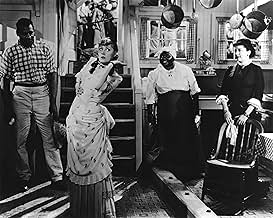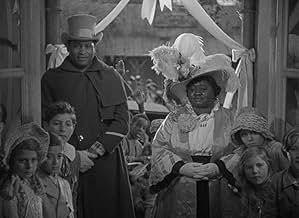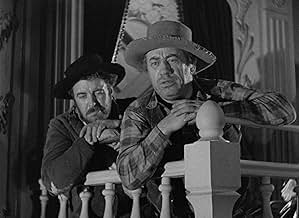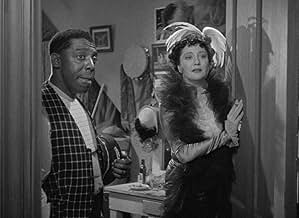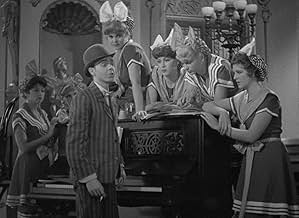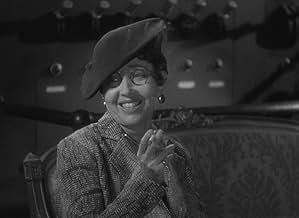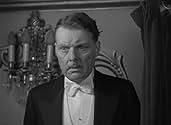PUNTUACIÓN EN IMDb
7,4/10
3,9 mil
TU PUNTUACIÓN
Añade un argumento en tu idiomaDespite her mother's objections, the naive young daughter of a show boat captain is thrust into the limelight as the company's new leading lady.Despite her mother's objections, the naive young daughter of a show boat captain is thrust into the limelight as the company's new leading lady.Despite her mother's objections, the naive young daughter of a show boat captain is thrust into the limelight as the company's new leading lady.
- Dirección
- Guión
- Reparto principal
- Premios
- 3 premios y 1 nominación en total
Maude Allen
- Fat Woman
- (sin acreditar)
Reseñas destacadas
When we talk about adaptions of Show Boat for the screen, we talk first about this one and then the others. If for no other reason than it gives us a chance to see three of the original performers from the original Broadway cast, Charles Winninger, Helen Morgan, and Francis X. Mahoney. Their performances on stage and on the screen became career roles for each.
Also Allan Jones and Irene Dunne are as perfect a Gaylord Ravenal and Magnolia Hawkes as you'll ever find. Irene was THE Jerome Kern girl on the silver screen, she was lucky to be in three musical adaptions of his shows, this one and Roberta and Sweet Adeline. His songs and her voice seem to be made for each other.
Ravenal's part is one of the most difficult to do in musicals. In the 1951 Show Boat Howard Keel sang wonderfully, but he projects too strong an image for the part. Gaylord Ravenal is a charming, but a very weak character. Allan Jones was the one who really got it right and it's on Ravenal's performance that the whole plot of the show turns on. He really rings true in Hattie McDaniel's assessment of him as the kind of gentlemen it's a pleasure to wait on.
James Whale as director really captures the spirit of 20 years on each side of the turn of the last century with warts and all. Show Boat as a play was bold in its day in tackling racism and miscegenation. Even when this was produced first in 1927 there were still miscegenation laws on the books. He gave Helen Morgan the career role she was most identified with.
Helen Morgan personified the phrase torch singer. From 1927 until this film she had descended into alcoholism and five years from this film she would have passed away from the effects of same. She had a career in Hollywood as well as Broadway and this was her final effort. How fortunate we are to have a filmed record of her performance and her singing of Can't Help Lovin' That Man and Bill.
Ravenal and Magnolia are given three great ballads to sing, classics all, Make Believe and You Are Love and Why Do I Love You. The first two are sung by Jones and Dunne and the third was eliminated from the film although it is heard on the soundtrack. Jerome Kern and Oscar Hammerstein wrote another song I Have the Room Above which is also a most charming duet.
Of course no discussion of Show Boat is complete without Paul Robeson and Ol' Man River. Believe it or not Robeson wasn't in the original Broadway cast. The Broadway opening was delayed and Robeson had some other contractual commitments in 1927. Another black baritone concert singer named Jules Bledsoe introduced Ol' Man River, arguably the greatest song Jerome Kern ever wrote. It became a signature song for Paul Robeson in both stage performances of Show Boat and in this film. His presence in singing Ol' Man River is another reason for this being the greatest Show Boat of all.
Robeson also has a duet with Hattie McDaniel in I Still Suits Me another song Kern and Hammerstein wrote for this film. It's a nice comedy duet. In fact I would say that Show Boat and Annie Get Your Gun are the two shows with the most hit songs in them ever written.
Show Boat is a grand American classic. Somewhere as I write this review there is a company performing right now on this planet. It will be so for generations to come.
Also Allan Jones and Irene Dunne are as perfect a Gaylord Ravenal and Magnolia Hawkes as you'll ever find. Irene was THE Jerome Kern girl on the silver screen, she was lucky to be in three musical adaptions of his shows, this one and Roberta and Sweet Adeline. His songs and her voice seem to be made for each other.
Ravenal's part is one of the most difficult to do in musicals. In the 1951 Show Boat Howard Keel sang wonderfully, but he projects too strong an image for the part. Gaylord Ravenal is a charming, but a very weak character. Allan Jones was the one who really got it right and it's on Ravenal's performance that the whole plot of the show turns on. He really rings true in Hattie McDaniel's assessment of him as the kind of gentlemen it's a pleasure to wait on.
James Whale as director really captures the spirit of 20 years on each side of the turn of the last century with warts and all. Show Boat as a play was bold in its day in tackling racism and miscegenation. Even when this was produced first in 1927 there were still miscegenation laws on the books. He gave Helen Morgan the career role she was most identified with.
Helen Morgan personified the phrase torch singer. From 1927 until this film she had descended into alcoholism and five years from this film she would have passed away from the effects of same. She had a career in Hollywood as well as Broadway and this was her final effort. How fortunate we are to have a filmed record of her performance and her singing of Can't Help Lovin' That Man and Bill.
Ravenal and Magnolia are given three great ballads to sing, classics all, Make Believe and You Are Love and Why Do I Love You. The first two are sung by Jones and Dunne and the third was eliminated from the film although it is heard on the soundtrack. Jerome Kern and Oscar Hammerstein wrote another song I Have the Room Above which is also a most charming duet.
Of course no discussion of Show Boat is complete without Paul Robeson and Ol' Man River. Believe it or not Robeson wasn't in the original Broadway cast. The Broadway opening was delayed and Robeson had some other contractual commitments in 1927. Another black baritone concert singer named Jules Bledsoe introduced Ol' Man River, arguably the greatest song Jerome Kern ever wrote. It became a signature song for Paul Robeson in both stage performances of Show Boat and in this film. His presence in singing Ol' Man River is another reason for this being the greatest Show Boat of all.
Robeson also has a duet with Hattie McDaniel in I Still Suits Me another song Kern and Hammerstein wrote for this film. It's a nice comedy duet. In fact I would say that Show Boat and Annie Get Your Gun are the two shows with the most hit songs in them ever written.
Show Boat is a grand American classic. Somewhere as I write this review there is a company performing right now on this planet. It will be so for generations to come.
There are a couple of famous, great songs in the opening 15 minutes of this film that hooked me in to watch the entire two-hour film.
I don't think the two-hour production ever wound up matching those early minutes but I still enjoyed it enough to give it "8 stars." Also, I still think it's better than the more-famous 1951 color re-make. It's a shame this 1936 film is not available on DVD, at least at this point here in the U.S.
Funny, but I did not particularly care for the two leading actors voices - Irene Dunne and Allan Jones. They are just two high-pitched for my tastes. I preferred the deep voice of Paul Robeson and was pleasantly surprised how well Hatie McDaniel sang.
The fun part of the film, however, wasn't the music but the story. It's pretty entertaining and a key reason for that was Charles Winniger, who keeps it alive with good humor. All the characters, except for Helen Westley's, are "good guys." and nice to follow. The story has a good mixture of drama, humor, sadness, sentimentality and song.
Also, there is some nice closeup photography with some great facial expressions. Some just make you laugh right out loud.
I am in agreement with those who think "Show Boat" was the best-ever and very good feel-good film.
I don't think the two-hour production ever wound up matching those early minutes but I still enjoyed it enough to give it "8 stars." Also, I still think it's better than the more-famous 1951 color re-make. It's a shame this 1936 film is not available on DVD, at least at this point here in the U.S.
Funny, but I did not particularly care for the two leading actors voices - Irene Dunne and Allan Jones. They are just two high-pitched for my tastes. I preferred the deep voice of Paul Robeson and was pleasantly surprised how well Hatie McDaniel sang.
The fun part of the film, however, wasn't the music but the story. It's pretty entertaining and a key reason for that was Charles Winniger, who keeps it alive with good humor. All the characters, except for Helen Westley's, are "good guys." and nice to follow. The story has a good mixture of drama, humor, sadness, sentimentality and song.
Also, there is some nice closeup photography with some great facial expressions. Some just make you laugh right out loud.
I am in agreement with those who think "Show Boat" was the best-ever and very good feel-good film.
No question that this is the Show Boat with soul. The '51 version has some lovely chorus numbers, including a beautiful opening sequence, but it is entirely safe and a predictable piece of MGM-dom.
On this 1936 version, I found myself thinking "There isn't a dull moment in this thing".
The pacing is fast and most unsentimental. The editing is so curt as to be almost surreal, and songs are suddenly launched out of nowhere, which is curiously satisfying. To be truthful, the film's strongest cohesive stretch is its first third, after which the story-telling becomes a bit rushed (presumably) to keep the film to a tolerable length. Hattie McDaniel and Paul Robeson are magical. McDaniel's first scene is positively electric and Robeson is given to a pleasant, warm demeanor, and both he and McDaniel seem surprisingly modern during a time in which blacks were seldom portrayed as such, especially in a mixed cast.
Charles Winninger shows his Vaudeville roots here, and he does a most riveting take on the Show Boat stage, portraying a melodrama for two. His timing is perfect, and his energy is inspiring throughout the picture.
Magnolia's blackface peregrinations do ring true to the time (more 1870's, than 1930's), but the wince-worthy scenes are more those of the black river boat hands who must constantly be shown bucking and winging their way to the irresistible music, eyes rolling.
The ending has some satisfaction to it, and is lightened considerably by the fact that Gaylord Ravinal is not completely humiliated by story's end. This last scene must have somehow anticipated "A Star Is Born", with undying love and honor being its undercurrent theme.
George Gershwin once stated on network radio that Kern's [Show Boat] score was the finest light opera in American history. It may still be. Just the bridge to "Only Make Believe" is heart stopping stuff.
On this 1936 version, I found myself thinking "There isn't a dull moment in this thing".
The pacing is fast and most unsentimental. The editing is so curt as to be almost surreal, and songs are suddenly launched out of nowhere, which is curiously satisfying. To be truthful, the film's strongest cohesive stretch is its first third, after which the story-telling becomes a bit rushed (presumably) to keep the film to a tolerable length. Hattie McDaniel and Paul Robeson are magical. McDaniel's first scene is positively electric and Robeson is given to a pleasant, warm demeanor, and both he and McDaniel seem surprisingly modern during a time in which blacks were seldom portrayed as such, especially in a mixed cast.
Charles Winninger shows his Vaudeville roots here, and he does a most riveting take on the Show Boat stage, portraying a melodrama for two. His timing is perfect, and his energy is inspiring throughout the picture.
Magnolia's blackface peregrinations do ring true to the time (more 1870's, than 1930's), but the wince-worthy scenes are more those of the black river boat hands who must constantly be shown bucking and winging their way to the irresistible music, eyes rolling.
The ending has some satisfaction to it, and is lightened considerably by the fact that Gaylord Ravinal is not completely humiliated by story's end. This last scene must have somehow anticipated "A Star Is Born", with undying love and honor being its undercurrent theme.
George Gershwin once stated on network radio that Kern's [Show Boat] score was the finest light opera in American history. It may still be. Just the bridge to "Only Make Believe" is heart stopping stuff.
Superb casting, wonderful music, and simple but literate dialogue. Paul Robeson's rendition of Old Man River is captivating, and this film is the only time I've heard the second stanza of the song which I'm sure many people would feel is not politically correct for our day. This really is an elegant production.
10preppy-3
The BEST version ever of the musical. It follows a show boat and the family that runs it through three generations concentrating on Magnolia (Irene Dunne) and her husband Ravenel (Allen Jones).
Some people have complained that Dunne's high-pitched singing voice is TOO high-pitched...they're not completely wrong. Still she sings in tune and her "Make Believe" duet with Jones is just great. Actually all the songs are great and belted out by the cast--highlights are "Can't Help Lovin' That Man", "Bill" and the great Paul Robeson doing "Old Man River". The movie also is very faithful to the stage play--it has almost all the songs and manages to fit a 3 hour play into a 2 hour film. The last section with Kim seems rushed but that's understandable.
Dunne is just great as Magnolia--very sweet and lovable. The only strange point is her dancing to "Can't Help..."--the dress is way too constricting and she has a strange look on her face. Jones is wooden but but has a wonderful singing voice. Helen Morgan was taken from the stage show to recreate Julie. She stops the movie TWICE with "Can't Help..." and "Bill". She has a beautiful voice and is a superb actress. Her character disappears completely halfway through...but it's the same in the stage play. In the book her character ends up working in a house of prostitution--there was NO way they could have gotten that on the screen back in 1936! Everybody else is great and the movie moves very quickly.
It's much better than the 1950s version. The 50s version IS in color and opens with a great number...but most of the singing is overdubbed, the story is brutally cut down and "Can't Help..." is thrown away!
This has it all over that one. Also director James Whale reportedly liked this one above all his other films--he did a few other little films like "Frankenstein" and "Bride of Frankenstein"! Beautiful songs, some truly lovely photography (the moonlight scenes on top of the showboat are dreamlike) and a quick story. Just simply one of the great Hollywood musicals. A must see!
Some people have complained that Dunne's high-pitched singing voice is TOO high-pitched...they're not completely wrong. Still she sings in tune and her "Make Believe" duet with Jones is just great. Actually all the songs are great and belted out by the cast--highlights are "Can't Help Lovin' That Man", "Bill" and the great Paul Robeson doing "Old Man River". The movie also is very faithful to the stage play--it has almost all the songs and manages to fit a 3 hour play into a 2 hour film. The last section with Kim seems rushed but that's understandable.
Dunne is just great as Magnolia--very sweet and lovable. The only strange point is her dancing to "Can't Help..."--the dress is way too constricting and she has a strange look on her face. Jones is wooden but but has a wonderful singing voice. Helen Morgan was taken from the stage show to recreate Julie. She stops the movie TWICE with "Can't Help..." and "Bill". She has a beautiful voice and is a superb actress. Her character disappears completely halfway through...but it's the same in the stage play. In the book her character ends up working in a house of prostitution--there was NO way they could have gotten that on the screen back in 1936! Everybody else is great and the movie moves very quickly.
It's much better than the 1950s version. The 50s version IS in color and opens with a great number...but most of the singing is overdubbed, the story is brutally cut down and "Can't Help..." is thrown away!
This has it all over that one. Also director James Whale reportedly liked this one above all his other films--he did a few other little films like "Frankenstein" and "Bride of Frankenstein"! Beautiful songs, some truly lovely photography (the moonlight scenes on top of the showboat are dreamlike) and a quick story. Just simply one of the great Hollywood musicals. A must see!
¿Sabías que...?
- CuriosidadesSpecial permission had to be granted from the Hays Office in order to retain the famous miscegenation (interracial marriage) sequence in the movie. Miscegenation was banned as a film subject, and had been excluded from Show Boat (1929).
- PifiasWhen Joe begins to sing "Ol' Man River", he picks up a board and begins to whittle it. He slices off two pieces, and then the camera switches to an oblique shot, but now the board is whittled to a slender rod.
- Créditos adicionalesIn the opening credits, there is a cardboard cutout display of a show boat parade, with cutout paper townspeople watching it, on a moving turntable. The parade revolves past the camera carrying cardboard banners on which are printed the title and other credits. Most of the parade figures are simply figures, but among them cutouts of Paul Robeson and Helen Morgan can be seen. (The appearance of these figures does not coincide with the appearance of their names onscreen.) In the background shadows of a paddlewheel and a riverboat can be seen.
- ConexionesFeatured in The All Talking, All Singing, All Dancing Show (1973)
- Banda sonoraCotton Blossom
(1927) (uncredited)
Music by Jerome Kern
Lyrics by Oscar Hammerstein II
Sung by offscreen mixed chorus (during opening credits) and in opening scene by mixed chorus of dock workers
Selecciones populares
Inicia sesión para calificar y añadir a tu lista para recibir recomendaciones personalizadas
- How long is Show Boat?Con tecnología de Alexa
- This version of "Show Boat" is supposed to be extremely faithful to the stage musical. What changes have been made?
Detalles
- Duración1 hora 53 minutos
- Color
- Relación de aspecto
- 1.37 : 1
Contribuir a esta página
Sugerir un cambio o añadir el contenido que falta

Principal laguna de datos
By what name was Magnolia (1936) officially released in India in English?
Responde
